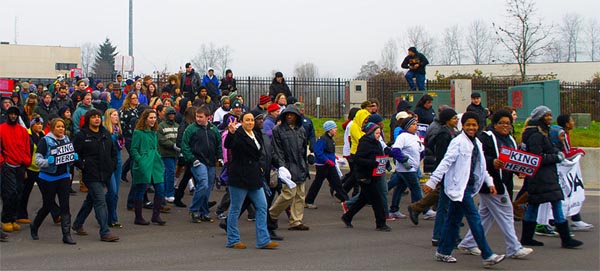 |
| A march in Oregon on Martin Luther King Day (Wikipedia) |
Note: Dr. Martin Luther King, Jr. is widely respected for his civil rights work. But some opposed the establishment of a holiday in his honor, and others even watered it down by including a Confederate general in the celebrations!
Get Ready: How important do you find the issue of civil rights--equal opportunity for all people? Have you ever contributed to the advancement of rights for all?
Dr. Martin Luther King, Jr., was a well-known and extremely controversial figure. The non-violent path he followed to achieve civil rights for blacks and others in America was paved with contention: the confrontations over black access to public space, the jailing of Dr. King and his followers for breaking laws they deemed unfair, and above all, the March on Washington, when 200,000 to 300,000 people gathered to hear Dr. King deliver what has become known as his "I Have a Dream" speech.
Despite the reverence with which most people regard him today, the techniques he used challenged the status quo, and were very threatening to some elements of society. (If everyone had been accepting of his message, it wouldn't have been necessary!)
The third Monday in January has been set aside to commemorate his life, placing it near his birth date of January 15. What some do not realize, however, is that the controversy experienced by Dr. King during his life continued to swirl around this holiday declared after his death.
For example, the first time the U.S. Congress tried to create the holiday (in 1979, 11 years after his death), they failed. One argument presented against the law's passage was that Dr. King was a private citizen and had never held public office. Some felt, however, that this position was covering up a bias against Dr. King and his work.
Several years later, despite tremendous public support for the holiday, the wrangling continued, led largely by senators from the American South. But it finally passed in 1983, and the holiday was first observed in 1986.
But that's not the end of the story. Several states at first chose not to celebrate the holiday (though all do now). Others have chosen to broaden its emphasis, creating names that included "Human Rights Day" or "Civil Rights Day."
But a few states--again associated with the South--took a unique spin. They combined the celebration of Dr. King's birthday with that of Confederate General Robert E. Lee, who was born on January 19 (in 1807). This waters down the respect shown to Dr. King, honoring a man who fought against the United States in a war that is widely understood to be about abolishing slavery.
--------Read more: https://en.wikipedia.org/wiki/Martin_Luther_King_Jr._Day
Practice: Match the term to its definition below:
- abolishing
- bias
- non-violent
- paved
- reverence
- spin
- status quo
- swirl
- waters down
- wrangling
- (metaphorically) covered with
- unjustified hostility
- viewpoint; slant
- getting rid of
- respect; honor
- peaceful
- the situation as it stands
- weakens
- arguing
- move rapidly in a circle
Answers are in the first comment below.
Submitted to the Shenzhen Daily for February 14, 2017


Answers to the Practice: 1. d; 2. b; 3. f; 4. a; 5. e; 6. c; 7. g; 8. j; 9. h; 10. i
ReplyDelete